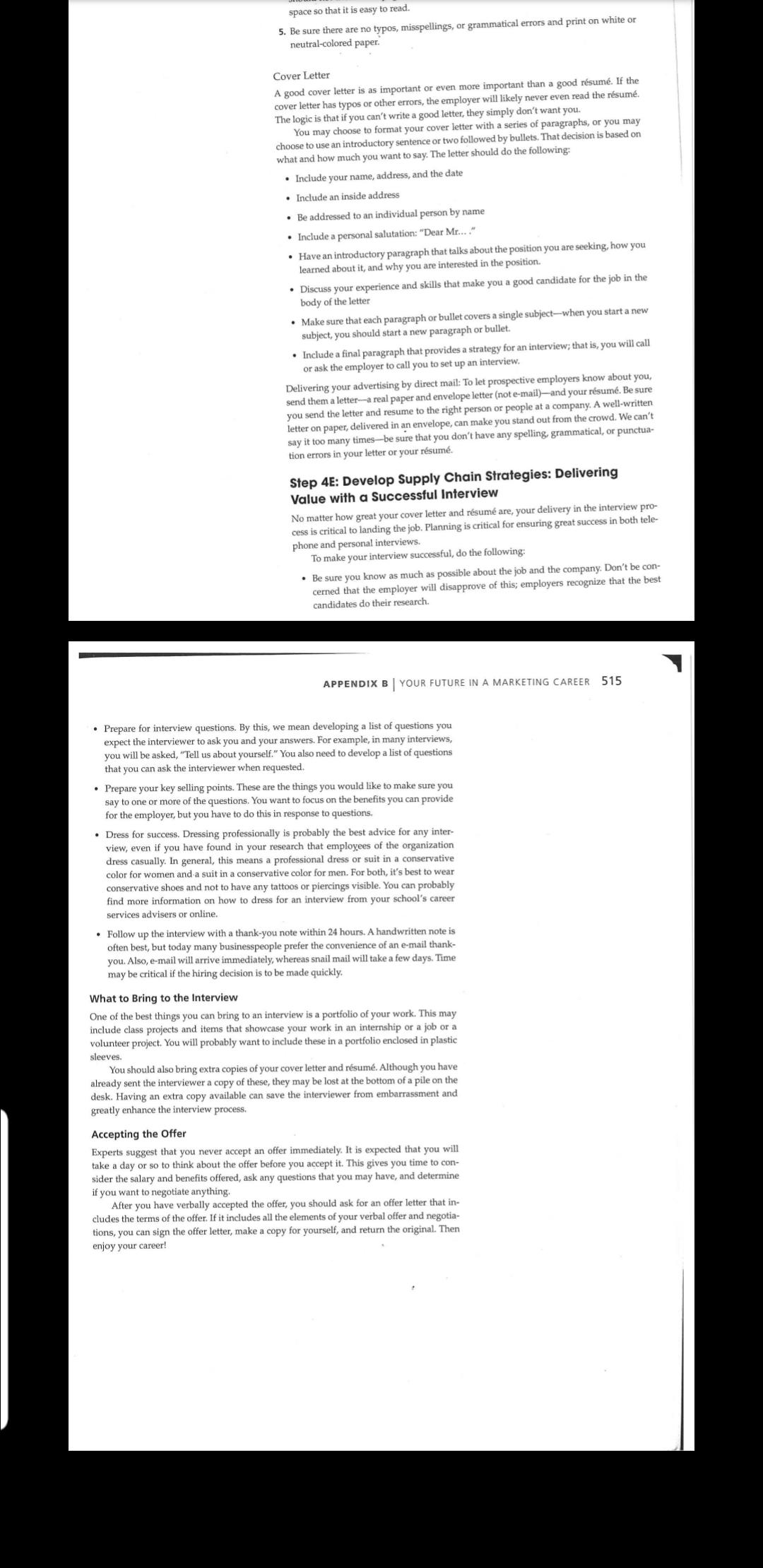Answered step by step
Verified Expert Solution
Question
1 Approved Answer
space so that it is easy to read. 5. Be sure there are no typos, misspellings, or grammatical errors and print on white or

space so that it is easy to read. 5. Be sure there are no typos, misspellings, or grammatical errors and print on white or neutral-colored paper. Cover Letter A good cover letter is as important or even more important than a good rsum. If the cover letter has typos or other errors, the employer will likely never even read the rsum. The logic is that if you can't write a good letter, they simply don't want you. You may choose to format your cover letter with a series of paragraphs, or you may s based on choose to use an introductory sentence or two followed by bullets. That decision. what and how much you want to say. The letter should do the following: Include your name, address, and the date Include an inside address Be addressed to an individual person by name Include a personal salutation: "Dear Mr...." Have an introductory paragraph that talks about the position you are seeking, how you learned about it, and why you are interested in the position. Discuss your experience and skills that make you a good candidate for the job in the body of the letter Make sure that each paragraph or bullet covers a single subject-when you start a new subject, you should start a new paragraph or bullet. Include a final paragraph that provides a strategy for an interview; that is, you will call or ask the employer to call you to set up an interview. Delivering your advertising by direct mail: To let prospective employers know about you, send them a letter-a real paper and envelope letter (not e-mail)-and your rsum. Be sure you send the letter and resume to the right person or people at a company. A well-written letter on paper, delivered in an envelope, can make you stand out from the crowd. We can't say it too many times-be sure that you don't have any spelling, grammatical, or punctua- tion errors in your letter or your rsum. Step 4E: Develop Supply Chain Strategies: Delivering Value with a Successful Interview No matter how great your cover letter and rsum are, your delivery in the interview pro- cess is critical to landing the job. Planning is critical for ensuring great success in both tele- phone and personal interviews. To make your interview successful, do the following: Be sure you know as much as possible about the job and the company. Don't be con- cerned that the employer will disapprove of this; employers recognize that the best candidates do their research. APPENDIX B YOUR FUTURE IN A MARKETING CAREER 515 Prepare for interview questions. By this, we mean developing a list of questions you expect the interviewer to ask you and your answers. For example, in many interviews, you will be asked, "Tell us about yourself." You also need to develop a list of questions that you can ask the interviewer when requested. Prepare your key selling points. These are the things you would like to make sure you say to one or more of the questions. You want to focus on the benefits you can provide for the employer, but you have to do this in response to questions. Dress for success. Dressing professionally is probably the best advice for any inter- view, even if you have found in your research that employees of the organization dress casually. In general, this means a professional dress or suit in a conservative color for women and a suit in a conservative color for men. For both, it's best to wear conservative shoes and not to have any tattoos or piercings visible. You can probably find more information on how to dress for an interview from your school's career services advisers or online. Follow up the interview with a thank-you note within 24 hours. A handwritten note is often best, but today many businesspeople prefer the convenience of an e-mail thank- you. Also, e-mail will arrive immediately, whereas snail mail will take a few days. Time may be critical if the hiring decision is to be made quickly. What to Bring to the Interview One of the best things you can bring to an interview is a portfolio of your work. This may include class projects and items that showcase your work in an internship or a job or a volunteer project. You will probably want to include these in a portfolio enclosed in plastic sleeves. You should also bring extra copies of your cover letter and rsum. Although you have already sent the interviewer a copy of these, they may be lost at the bottom of a pile on the desk. Having an extra copy available can save the interviewer from embarrassment and greatly enhance the interview process. Accepting the Offer Experts suggest that you never accept an offer immediately. It is expected that you will take a day or so to think about the offer before you accept it. This gives you time to con- sider the salary and benefits offered, ask any questions that you may have, and determine if you want to negotiate anything. After you have verbally accepted the offer, you should ask for an offer letter that in- cludes the terms of the offer. If it includes all the elements of your verbal offer and negotia- tions, you can sign the offer letter, make a copy for yourself, and return the original. Then enjoy your career!
Step by Step Solution
There are 3 Steps involved in it
Step: 1

Get Instant Access to Expert-Tailored Solutions
See step-by-step solutions with expert insights and AI powered tools for academic success
Step: 2

Step: 3

Ace Your Homework with AI
Get the answers you need in no time with our AI-driven, step-by-step assistance
Get Started


